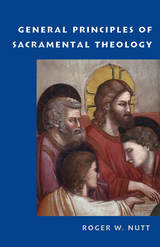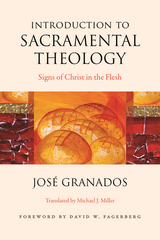2 books about Sacramental Theology

General Principles of Sacramental Theology
Roger W. Nutt
Catholic University of America Press, 2017
General Principles of Sacramental Theology addresses a current lacuna in English language theological literature. Bernard Leeming’s highly respected book Principles of Sacramental Theology was published more than sixty years ago. Since that time, there has been a noted decrease, especially in English language sacramental theology, in treatments of the basic topics and principles – such as the nature of the sacraments of signs, sacramental grace, sacramental character, sacramental causality, sacramental intention, the necessity and number of the sacraments, sacramental matter and form, inter alia – which apply to all of the sacraments. This book will be of use in seminary, graduate, and undergraduate courses. The sacraments play an irreplaceable role in pursuing a Universal Call to Holiness that is so central to Vatican II’s teaching.
[more]

Introduction to Sacramental Theology
Signs of Christ in the Flesh
Jose Granados
Catholic University of America Press, 2021
Introduction to Sacramental Theology presents a complete overview of sacramental theology from the viewpoint of the body. This viewpoint is supported, in the first place, by Revelation, for which the sacraments are the place where we enter into contact with the body of the risen Jesus. It is a viewpoint, secondly, which is firmly rooted in our concrete human bodily experience, thus allowing for a strong connection between faith and life, creation and redemption.
From this point of view, the treatise on the sacraments occupies a strategic role. For the sacraments appear, not as the last of a series of topics (after dealing with Creation, Christ, the Church), but as the original place in which to stand in order to contemplate the entire Christian mystery. This point of view of the body, which resonates with contemporary philosophy, sheds fruitful light on classical themes, such as the relationship of the sacraments with creation, the composition of the sacramental sign, the efficacy of the sacraments, the sacramental character, the role of the minister, or the relationship of the sacrament with the Church as a sacrament.
As a result of this approach, the Eucharist takes on a central role, since this is the sacrament where the body of Jesus is made present. The rest of the sacraments are seen as prolongations of the eucharistic body, so as to fill all the time and space of the faithful. This foundation of the theology of the sacraments in eucharistic theology is supported by an analysis of the patristic and medieval tradition.
In order to support its conclusions, Introduction to Sacramental Theology examines the doctrine of Scripture (especially St. John and St. Paul), the main patristic and medieval authors (St. Augustine, Hugh of St. Victor, St. Bonaventure, St. Thomas Aquinas), the response of Trent to the protestant challenges, up to modern authors such as Scheeben, Rahner, Ratzinger, or Chauvet, including the teaching of Vatican II about the Church as a kind of sacrament.
[more]
READERS
Browse our collection.
PUBLISHERS
See BiblioVault's publisher services.
STUDENT SERVICES
Files for college accessibility offices.
UChicago Accessibility Resources
home | accessibility | search | about | contact us
BiblioVault ® 2001 - 2024
The University of Chicago Press









